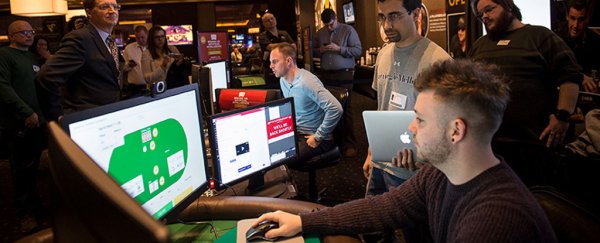Four of the world's best professional poker players have been trounced in an epic 20-day competition, with an artificial intelligence (AI) system winning big after dominating 120,000 hands of no-limit Texas Hold'em.
The AI, called Libratus, led the human players by almost US$1.8 million in chips by the end of the competition – a stark contrast to just two years ago, when a different program only managed to carve out a technical tie against four human pros. In the 2017 rematch, the humans never even had a chance.
Libratus, developed by computer scientists at Carnegie Mellon University (CMU), follows on the heels of previous AIs that have bested humans at games – like Google's DeepMind, which owned some of the world's most formidable Go champions.
But learning poker is more nuanced, psychological territory – being able to master the art of bluffing your opponent while also reading their cues shows how incredibly sophisticated AI is getting at challenges where success relies on more than just mastering the rules of the table.
"The computer can't win at poker if it can't bluff," says CMU's head of computer science, Frank Pfenning.
"Developing an AI that can do that successfully is a tremendous step forward scientifically and has numerous applications. Imagine that your smartphone will someday be able to negotiate the best price on a new car for you. That's just the beginning."
Libratus's poker strategies were honed on the equivalent of 15 million hours of gameplay before the competition even began, with the AI installed on a supercomputer running at 1.35 petaflops and with 274 terabytes of memory.
Those specs means the supercomputer is about 7,250 times as fast as a high-end notebook PC, with about 17,500 times as much memory.
But the AI's killer feature was learning from the human pros as the competition advanced, and adaptively patching up its own strategies and play styles whenever the other players learned to take advantage of them.
"After play ended each day, a meta-algorithm analysed what holes the pros had identified and exploited in Libratus's strategy," says lead researcher Tuomas Sandholm.
"It then prioritised the holes and algorithmically patched the top three using the supercomputer each night… Typically researchers develop algorithms that try to exploit the opponent's weaknesses. In contrast, here the daily improvement is about algorithmically fixing holes in our own strategy."
The approach was a successful one – even if it led to some despair among the human competitors, who had to continually adjust their own tactics during a marathon 20-day contest.
"The bot gets better and better every day," said one of the pro players, Jimmy Chou, mid-way through the competition. "It's like a tougher version of us."
The sentiments were echoed by one of Chou's fellow competitors, Dong Kim.
"I didn't realise how good it was until today," he told Cade Metz at Wired on day 10 of the competition.
"I felt like I was playing against someone who was cheating, like it could see my cards. I'm not accusing it of cheating. It was just that good."
You can see how effective Libratus's adaptability was in the graph below:
While the AI took an early lead in the first five days of competition, by day six, all the players were about equal in chips.
But then Libratus just took off, sharply gaining about $1 million in chips over the next nine days, while the human players consistently lost ground they weren't able to recover.
Now that the contest is over, the CMU researchers say they'll be sharing the AI's secrets, starting with a presentation at the Association for the Advancement of Artificial Intelligence meeting this month in San Francisco.
Academic papers discussing the programming are expected in the coming months.
Away from the world of high-stakes card games, the team says Libratus's decision-making capabilities could end up playing a role in business negotiation, cybersecurity, and even medical treatments.
As for the players, it's not worth feeling too bad for the pros, who despite their trouncing, will each share in a $200,000 prize pool for their part in the contest.
That said, they probably don't want to have to ever play 20 days of straight poker against an AI again. On the last day of competition, one of the pros, Daniel McAulay, turned to a spectator with a question that may have only been half-joking.
"How much do I have to pay you to play the last 50 hands?" he asked. "Uhhhh, this is so brutal."
